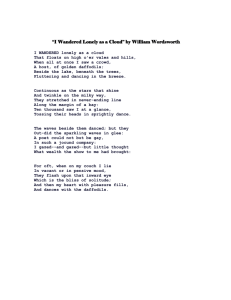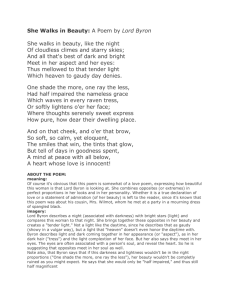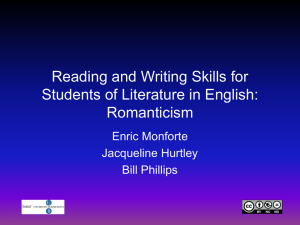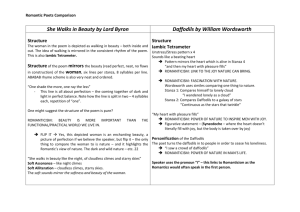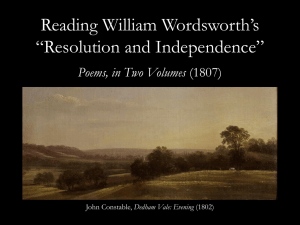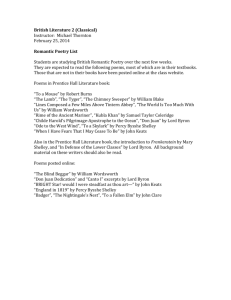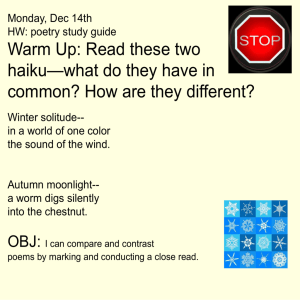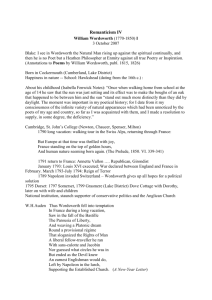Romanticism
advertisement
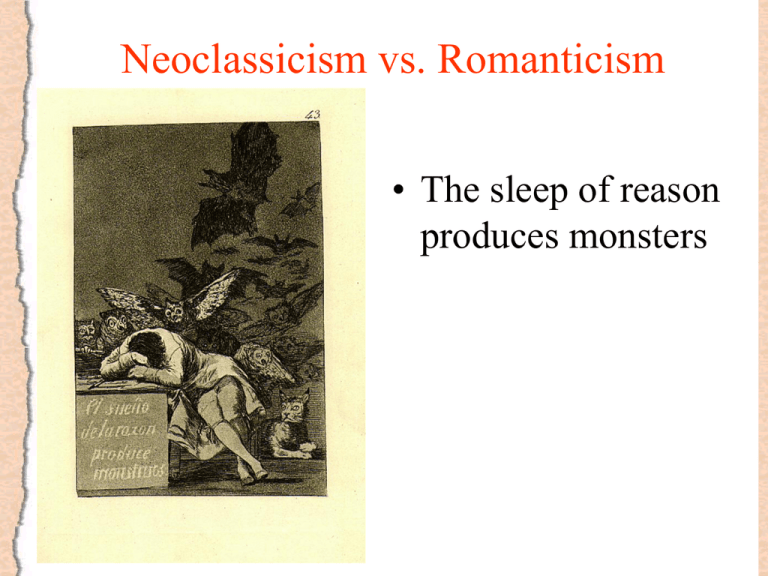
Neoclassicism vs. Romanticism • The sleep of reason produces monsters Neoclassicism • • • • • • Symmetry ; Proportion; order Clarity Restraint Decorum Harmony Imitation of Greek and Roman originals • Dominance of pre-established rules • Purpose of art: to instruct by delighting • Dominance of the moral over the aesthetic function of art. Romanticism • Prevalence of the individual, subjective, personal, spontaneous • Emphasis on the power of imagination, emotion, irrationality • Search for the transcendental. Imagination as way to reach transcendental experience/truth • Appreciation for the power/beauty of untamed nature; pantheism; interdependence of living things Romanticism • Preoccupation with genius, the individual, the exceptional, the exotic, mysterious, weird, occult, monstrous, diseased, satanic, medieval • Artist as the supreme creator, rejection of rules, importance of experimentation Romanticism J.M.W. Turner, Snowstorm Romanticism Romantic garden Neoclassicism: Romanticism: keyword:REASON keyword: PASSION Nature is defined as human nature Nature is defined as natural environment (woods, mountains, etc) Society more important than Individual more important than individual society Imitation Originality Tradition Experimentation Rules and order Freedom Mechanical form (imposed from Organic form (growing from inside) outside) Logic Intuition Reason Imagination, Emotion Attempted objectivity Accepted subjectivity Town or cultivated landscape Country, preferably untouched nature Constraint Spontaneity Conformity Independence, Rebellion Cultivated, formal, social the primitive becomes focus Neoclassicism vs. Romanticism • Society • Nature • Reason • Emotion • Intellect • Senses and sensuality • Extroversion, balanced, didactic • Introversion, moody, self • The normative, the social, the citizen interrogative • Reason and social issues • Genius, Hero, the Exceptional • Poet’s skill and adherence to formal rules and traditional procedures • Passions and inner struggles • Study of Classical Poetic and Dramatic forms • Folklore, national and ethnic origins • Interest in the verifiable, the commonsensical, the familiar • Interest in the Medieval, the Exotic, the Mysterious, the Occult, the monstrous, the remote • Artistic Creativity and feeling Part VI. Background Knowledge • A literary movement, which took place in Britain between 1798 and 1832 and throughout Europe roughly between 1770 and 1848. • Politically it was inspired by the revolutions in Liberty, Equality America and France and popular wars of and Fraternity independence in some countries. Corruption, • Socially it expressed a more or less negative injustice, attitude toward the existing social and political inhumanity … conditions and supported progressive causes, though when these were frustrated it often produced a bitter, gloomy, and despairing outlook. Rousseau: “I felt before I thought” • Intellectually it marked a violent reaction to the rationalism of the Enlightenment and Classicism. • Emotionally it expressed an extreme assertion of the self. (emphasis on personal thoughts and feelings, often triggered by observation of nature) Characteristics of Romanticism • • • • • Imagination Idealization of Nature Individualism Glorification of the commonplace The lure of the exotic Imagination Man is all imagination, God is man and exists in us and we in him…All things exist in the human imagination. (William Blake) • Imagination: the supreme faculty of the mind (dynamic and active) • Imagination can change and create • Imagination can unify different elements into a complex whole. Nature Yet having felt the power of nature, by the gentle agency of natural objects, led me on to feel the passions that were not my own. (Wordsworth) • Different perspectives about nature: -- a healing power; -- a source of subject and image; -- a refuge from the artificial constructs of civilization. • Describing natural phenomena • Capturing “sensuous nuance” • Nature poetry: one of meditation Individualism I must create my own system or be enslaved by another man’s. (William Blake) Middle ages: Middle ages: emphasize on God; man lived chiefly for the future world Middleperiod: ages: emphasize God; of man chiefly for the on Renaissance man is theoncenter alllived concern; emphasized the future dignityworld of man and the importance of the present life Renaissance period: is the center of allgeneral concern; Enlightenment: saw man man as social man; the or universal emphasized on dignity of man were and themore importance the characteristics of the human behavior suitableof subject present life on God; man lived chiefly for the future world matter emphasize Enlightenment: sawisman socialofman; the general or Renaissance period: man theas center all concern; emphasized on of human behavior were more the universal dignity ofcharacteristics man and the importance of the present life suitable subject matteras social man; the general or universal Enlightenment: saw man characteristics of human behavior were more suitable subject matter Romanticism: • Saw man as an individual in the solitary state • Emphasized the special qualities of each individual’s mind “I am not made like anyone I have seen; I dare believe that I am not made like anyone in existence. If I am not superior, at least I am different.” (Rousseau) • Value the exploration and evaluation of the inner self • A prominence of first-person lyric poem “I” – the direct person of the poet example: Prelude (Wordsworth) • A change of direction from attention to the outer world of social civilization to the inner world of the human spirit Glorification of the commonplace I have wished to keep the Reader in the company of flesh and blood. (Wordsworth) • Materials: the commonplace, the natural, the simple • Common incidents and situations • Natural diction and language Suggested poem: Wordsworth: “The Solitary Reaper” The Lure of the Exotic • Wordsworth, Coleridge and Southey: lived by the riverside • Byron and Shelley: self-imposed exile • Expanded the imaginary horizons spatially and chronologically: -- the Middle Ages -- images of distant places • Allow free play to the supernatural Features of Romantic Literature 1. 2. 3. 4. 5. 6. Expressiveness Imagination Singularity Worship of nature Simplicity Age of poetry 1. Expressiveness: The romantics hold that the object of the artist should be the expression of the artist’s emotions, impressions, or beliefs. The role of instinct, intuition and the feeling of “the heart” is stressed instead of the neoclassicist’s emphasis on “the head”, on regularity, uniformity, decorum, and imitation of the classical writers. Decorous behavior or appearanc e 2. Imagination: Romantic literature puts great emphasis on the creative function of the imagination, seeing art as a formulation of intuitive, imaginative perceptions that tend to speak a nobler truth than that of fact, logic, or the here and now. 3. Singularity: Romantic poets have a strong love for the remote, the unusual, the strange, the supernatural, the mysterious, the splendid, the picturesque, and the illogical. 4. Worship of nature: Romantic poets see in nature a revelation of Truth, the “living garment of God”. In their view, the natural world is the dominant influence in changing people’s sensibilities; nature to them is a source of mental cleanness and spiritual understanding. 5. Simplicity: Romantic poets tend to turn to the humble people and the everyday life for subjects, take to using everyday language spoken by the rustic people as opposed to the poetic diction used by neoclassic writers. 6. The romantic period is an age of poetry: 2 generations The only great novelist is Walter Scott. •WILLIAM WORDSWORTH •SAMUEL T. COLERIDGE •Robert Southey Lake Poets • GEORGE BYRON • PERCY BYSSHE SHELLEY • JOHN KEATS Song The Rose Some say love, it is a river that drowns the tender reed. Some say love, it is a razor that leaves your soul to bleed. Some say love, it is a hunger, an endless aching need. I say love, it is a flower, and you it's only seed. It's the heart, afraid of breaking, that never learns to dance. It's the dream, afraid of waking, that never takes a chance. It's the one who won't be taken, who cannot seem to give. And the soul, afraid of dyin', that never learns to live. When the night has been too lonely, and the road has been too long And you think that love is only for the lucky and the strong, Just remember in the winter far beneath the bitter snows, Lies the seed, that with the sun's love, in the spring becomes the Rose. 英国文学史及选读 英语系 张海霞 •William Wordsworth •Samuel T. Coleridge •Robert Southey Lake Poets • George Byron • Percy Bysshe Shelley • John Keats (1770-1850) Neoclassicism vs. Romanticism • Society • Nature • Reason • Emotion • Intellect • Senses and sensuality • Extroversion, balanced, didactic • Introversion, moody, self interrogative • The normative, the social, the citizen • Genius, Hero, the Exceptional • Reason and social issues • Passions and inner struggles • Poet’s skill and adherence to formal rules and traditional procedures • Artistic Creativity and feeling • Folklore, national and ethnic origins • Study of Classical Poetic and Dramatic forms • Interest in the Medieval, the Exotic, the Mysterious, the Occult, the monstrous, the remote • Interest in the verifiable, the commonsensical, the familiar “all good poetry is the spontaneous overflow of powerful feeling” Poetry “takes its origin from emotion recollected in tranquility” “to give the charm of novelty to things of every day” “endeavoured to bring language near to the real language of men” “by fitting to metrical arrangement a selection of the real language of men” from the Preface to “Lyrical Ballads” Wordsworth’s Poetry • On nature • On rural people (1804) I wandered lonely as a cloud That floats on high o'er vales and hills, When all at once I saw a crowd, A host, of golden daffodils; Beside the lake, beneath the trees, Fluttering and dancing in the breeze. Continuous as the stars that shine And twinkle on the milky way, They stretched in never-ending line Along the margin of a bay: Ten thousand saw I at a glance, Tossing their heads in sprightly dance. The waves beside them danced, but they Outdid the sparkling waves in glee; A poet could not but gay, In such a jocund company! I gazed—and gazed—but little thought What wealth the show to me had brought: For oft, when on my couch I lie In vacant or in pensive mood, They flash upon that inward eye Which is the bliss of solitude; And then my heart with pleasure fills, And dances with the daffodils. I I wandered lonely as a cloud That floats on high o'er vales and hills, When all at once I saw a crowd, A host, of golden daffodils; Beside the lake, beneath the trees, Fluttering and dancing in the breeze. II Continuous as the stars that shine And twinkle on the milky way, They stretched in never-ending line Along the margin of a bay: Ten thousand saw I at a glance, Tossing their heads in sprightly dance. III The waves beside them danced, but they Outdid the sparkling waves in glee; A poet could not but gay, In such a jocund company! I gazed—and gazed—but little thought What wealth the show to me had brought: IV For oft, when on my couch I lie In vacant or in pensive mood, They flash upon that inward eye Which is the bliss of solitude; And then my heart with pleasure fills, And dances with the daffodils. I wandered lonely as a cloud That floats on high o'er vales and hills, When all at once I saw a crowd, A host, of golden daffodils; Beside the lake, beneath the trees, Fluttering and dancing in the breeze. Continuous as the stars that shine And twinkle on the milky way, They stretched in never-ending line Along the margin of a bay: Ten thousand saw I at a glance, Tossing their heads in sprightly dance. The waves beside them danced, but they Outdid the sparkling leaves in glee; A poet could not be but gay, In such a jocund company! I gazed—and gazed—but little thought What wealth the show to me had brought: For oft, when on my couch I lie In vacant or in pensive mood, They flash upon that inward eye Which is the bliss of solitude; And then my heart with pleasure fills, And dances with the daffodils. dance Wordsworth and Nature Cf. Shakespeare’s nature • He concentrates on the ways in which he responds and relates to the nature. He uses his poetry to look at the relationship between nature and human life, and to explore the belief that nature can have an impact on man’s emotional and spiritual lives. --- fusion of natural description with expressions of inward states of mind What is the exact impact? Read “Tintern Abbey” Wordsworth and Memory • Memory is crucial to Wordsworth throughout his poems. Pleasant, beautiful memories of nature work to preserve and restore the connection between the individual and the purity of the natural world. Read “Tintern Abbey” FIVE years have past; five summers, with the length Of five long winters! and again I hear These waters, … …… –These beauteous forms, Though a long absence, have not been to me As is a landscape to a blind man's eye: But oft, in lonely rooms, and 'mid the din Of towns and cities, I have owed to them In hours of weariness, sensations sweet, Felt in the blood, and felt along the heart; And passing even into my purer mind, With tranquil restoration: -- feelings too Of unremembered pleasure:… …… …… While with an eye made quiet by the power Of harmony, and the deep power of joy, We see into the life of things. …… For Study and Discussion • Try to write an appreciation of “The Daffodils” ! • Comment on Wordsworth’s views on nature! Commentary This simple poem, one of the loveliest and most famous in the Wordsworth canon, revisits the familiar subjects of nature and memory, this time with a particularly (simple) spare, musical eloquence. The plot is extremely simple, depicting the poet's wandering and his discovery of a field of daffodils by a lake, the memory of which pleases him and comforts him when he is lonely, bored, or restless. The poem's main brilliance lies in the reverse personification of its early stanzas. The speaker is metaphorically compared to a natural object, a cloud--"I wandered lonely as a cloud / That floats on high...", and the daffodils are continually personified as human beings, dancing and "tossing their heads" in "a crowd, a host." This technique implies his integration with the natural world and an inherent unity between man and nature. He tells in the poem the extent of his joy while he was actually among the daffodils, but the wealthier experience seems to have been in the recollection in tranquility of his association with that "jocund company." Though the experience of the "outer" eye was joyful, the experience of the "inward eye" was more joyful. Form The four six-line stanzas of this poem follow a quatrain-couplet rhyme scheme: ABABCC. Each line is metered in iambic tetrameter. A Solitary Reaper (1805) Stanza 1: An Image of a Solitary Reaper BEHOLD her, single in the field, Yon solitary Highland Lass! Reaping and singing by herself; Stop here, or gently pass! Alone she cuts and binds the grain, And sings a melancholy strain; O listen! for the Vale profound Is overflowing with the sound. Alone she cuts and binds the grain, And sings a melancholy strain; O listen! for the Vale profound Is overflowing with the sound. No Nightingale did ever chaunt More welcome notes to weary bands Of travellers in some shady haunt, Among Arabian sands: Breaking the silence of the seas Among the farthest Hebrides. Stanza 3: The Growth of the Mind Will no one tell me what she sings?— Perhaps the plaintive numbers flow For old, unhappy, far-off things, And battles long ago: Or is it some more humble lay, Familiar matter of to-day? Some natural sorrow, loss, or pain, That has been, and may be again? Stanza 4: Echo and Meditation Whate'er the theme, the Maiden sang As if her song could have no ending; I saw her singing at her work, And o'er the sickle bending;— I listen'd, motionless and still; And, as I mounted up the hill, The music in my heart I bore, Long after it was heard no more. Whate'er the theme, the Maiden sang As if her song could have no ending; I saw her singing at her work, And o'er the sickle bending;— Wordsworth and Solitary Images Lone figures (usually hermits, or the meditative poet/poetess) are already popular in 18th c.paintings & poetry, as symbols of rural retreat & philosophic musings on the meaning of life . Wordsworth further develops the lone figure in 2 directions: 1) often he/she is a kind of rural poor or even social outcast (at least someone living on the margin of proper society) 2) instead of giving him/her a voice (let he/she speaks), Wordsworth renders him/her into an “aesthetic object”, projecting his own Cf “观刈 thoughts, feelings and desires. 麦” 观刈麦 白居易(时为盩厔县尉) 田家少闲月,五月人倍忙。夜来南风起,小麦覆陇黄。 妇姑荷簟食,童稚携壶浆。相随饷田去,丁壮在南冈。 足蒸暑土气,背灼炎天光。力尽不知热,但惜夏日长。 复有贫妇人,抱子在其傍。右手秉遗穗,左臂悬敝筐。 听其相顾言,闻者为悲伤。家田输税尽,拾此充饥肠。 今我何功德,曾不事农桑。吏禄三百石,岁晏有馀粮。 念此私自愧,尽日不能忘。 -----全唐诗,卷424_6 For Study and Discussion Comment on artistic value of “The Solitary Reaper”! Commentary • Along with "I wandered lonely as a cloud," "The Solitary Reaper" is one of Wordsworth's most famous lyrics. The poet turns an ordinary “solitary Highland Lass” into an object of contemplation and aesthetic experience; her song, particularly, offers him poetic inspirations. • In "Tintern Abbey" Wordsworth said that he was able to look on nature and hear "human music"; in this poem, he writes specifically about real human music encountered in a beloved, rustic setting. The song of the young girl reaping in the fields is incomprehensible to him (a "Highland lass,“She is likely singing in Scots), and what he appreciates is its tone, its expressive beauty, and the mood it creates within him, rather than its explicit content, at which he can only guess. • The poem's structure is simple--the first stanza sets the scene, the second offers two bird comparisons for the music, the third wonders about the content of the songs, and the fourth describes the effect of the songs on the speaker-and its language is natural and unforced. Additionally, the final two lines of the poem ("Its music in my heart I bore / Long after it was heard no more") return its focus to the familiar theme of memory, and the soothing effect of beautiful memories on human thoughts and feelings. Form • The four eight-line stanzas of this poem are written in a tight iambic tetrameter. Each follows a rhyme scheme of ABABCCDD, though in the first and last stanzas the "A" rhyme is off (field/self and sang/work). Contribution: l Wordsworth started the modern poetry, the poetry of the growing inner self. l Wordsworth changed the course of English poetry by using ordinary speech of the language and by advocating a return to nature. Thanks George Gordon, Lord Byron (1788-1824) • Byron's fame rests not only on his writings but also on his life, which featured extravagant living, numerous love affairs, debts, separation, and marital exploits. He was famously described by Lady Caroline Lamb as "mad, bad, and dangerous to know".[ Byronic hero Prometheus • Rebel god (Titan) entrusted with molding man out of clay • Stole fire from Zeus and gave it to man • Chained to a rock • Eagle ate his liver each day • 13 generations later, Heracles killed the eagle Prometheus, Gustave Moreau Byron(拜伦) Major Works Lord Byron and Byronic hero Appreciation of his Works George Gordon Byron • Main works: ---2 brief poems: She Walks in Beauty, When We Two Parted ---2 narrative poems: Childe Harold’s Pilgrimage (1812-1818) Don Juan (1819-1824) ---1 dramatic poem: Manfred (1817) Childe Harold’s Pilgrimage • Byron's fame rests not only on his writings, but also on his life, which featured extravagant living, numerous love affairs, debts, separation, allegations of incest and bisexuality and an eventual death from fever after he travelled to fight on the Greek side in the Greek War of Independence. He was famously described by Lady Caroline Lamb as "mad, bad, and dangerous to know." Byronic hero • A theme that pervades much of Byron's work is that of the Byronic hero, an idealized but flawed character, a proud & mysterious rebel figure of noble origin. With immense superiority in his passions & powers, the Byronic hero would carry on his shoulders the burden of righting all the wrongs in an evil society, & would fight single-handedly against any kind of tyrannical rules either in government, in religion or in moral principles with unconquerable wills & inexhaustible energies. The conflict is usually one of rebellious individuals against outworn social systems & convention. • Exiled or solitary wanderer • Moody, passionate • Superior intellect • Heightened sensitivity, Spiritually wounded or physically disabled in some way • Rejects traditional values and moral codes History of Byronic Hero Byronic hero appears first in Childe Harold''s Pilgrimage, & then further developed in later works such as Oriented Tales, Manfred, & Don Juan in different guises. The figure is, to some extent, modeled on the life & personality of Byron himself, & makes Byron famous both at home and abroad. The literary history of the Byronic hero in English can be traced from Milton, especially Milton's interpretation of Lucifer as having justified complaint against God. Byron's influence was manifested by many authors and artists of the Romantic movement during the 19th century and beyond. An example of such a hero is Heathcliff from Emily Brontë's Wuthering Heights. From Don Juan 鲁迅评“The Isles of Greece”: “裴伦平时,又至有情愫于希腊,思想所趣, 如磁指南。特希腊时自由悉丧,入突厥 (土耳其)版图,受其羁縻,不敢抗拒。 诗人惋惜悲愤,往往见于篇章,怀千古之 光荣,哀后人之零落,或与斥责,或加激 励,思使之攘突厥而复兴,更睹往日耀灿 庄严之希腊, 如所作«不信者»(The Giaour)暨«堂祥»二 诗中,其怨愤谯责之切,与希冀之诚,无 不历然可征信也。” --- «摩罗诗力说» Sappho Apollo and the Muses Apollo and Daphne Caesar 哀希腊 一 希腊群岛呵,美丽的希腊群岛! 火热的萨弗在这里唱过恋歌; 在这里,战争与和平的艺术并兴, 狄洛斯崛起,阿波罗跃出海面! 永恒的夏天还把海岛镀成金, 可是除了太阳,一切已经消沉。 Homer Anacreon 二 开奥的缪斯,蒂奥的缪斯, 那英雄的竖琴,恋人的琵琶, 原在你的岸上博得了声誉, 而今在这发源地反倒喑哑; 呵,那歌声已远远向西流传, 远超过你祖先的“海岛乐园”。 Battle of Marathon 三 起伏的山峦望着马拉松— 马拉松望着茫茫的海波; 我独自在那里冥想一刻钟, 梦想希腊仍旧自由而欢乐; 因为,当我在波斯墓上站立, 我不能想象自己是个奴隶。 King Xerxes 四 一个国王高高坐在石山顶, 了望着萨拉密挺立于海外; 千万只船舶在山下靠停, 还有多少队伍全由他统率! 他在天亮时把他们数了数, 但日落的时候他们都在何处? 五 呵,他们而今安在?还有你呢, 我的祖国?在无声的土地上, 英雄的颂歌如今已沉寂—— 那英雄的心也不再激荡! 难道你一向庄严的竖琴, 竟至沦落到我的手里弹弄? 六 也好,置身在奴隶民族里, 尽管荣誉都已在沦丧中, 至少,一个爱国志士的忧思, 还使我作歌时感到脸红; 因为,诗人在这儿有什么能为? 为希腊人含羞,对希腊国落泪。 Spartans and Persians at Thermopylae 七 我们难道只好对时光悲哭 和惭愧?——我们的祖先却流血。 大地呵!把斯巴达人的遗骨 从你的怀抱里送回来一些! 哪怕给我们三百勇士的三个, 让德魔比利的决死战复活! 八 怎么,还是无声?一切都喑哑? 不是的!你听那古代的英魂 正象远方的瀑布一样喧哗, 他们回答:“只要有一个活人 登高一呼,我们就来,就来!” 噫!倒只是活人不理不睬。 Bacchus (Dionysus), God of Wine Baccus and Ariadne 九 算了,算了;试试别的调门: 斟满一杯萨摩斯的美酒! 把战争留给土耳其野人, 让开奥的葡萄的血汁倾流! 听呵,每一个酒鬼多么踊跃 响应这一个不荣誉的号召! Pyrrhic Dance 一○ 你们还保有庇瑞克的舞艺, 但庇瑞克的方阵哪里去了? 这是两课,为什么只记其一, 而把高尚而坚强的一课忘掉? 凯德谟斯给你们造了字体—— 难道他是为了传授给奴隶? 一一 把萨摩斯的美酒斟满一盅! 让我们且抛开这样的话题! 这美酒曾使阿纳克瑞翁 发为神圣的歌;是的,他屈于 波里克瑞底斯,一个暴君, 但这暴君至少是我们国人。 一二 克索尼萨斯的一个暴君 是自由的最忠勇的朋友: 暴君米太亚得留名至今! 呵,但愿现在我们能够有 一个暴君和他一样精明, 他会团结我们不受人欺凌! Hercules 一三 把萨摩斯的美酒斟满一盅! 在苏里的山岩,巴加的岸上, 住着一族人的勇敢的子孙, 不愧是斯巴达的母亲所养; 在那里,也许种子已经散播, 是赫剌克勒斯血统的真传。 一四 自由的事业别依靠西方人, 他们有一个做买卖的国王; 本土的利剑,本土的士兵, 是冲锋陷阵的唯一希望; 但土耳其武力,拉丁的欺骗, 会里应外合把你们的盾打穿。 一五 把萨摩斯的美酒斟满一盅! 树荫下正舞蹈着我们的姑娘—— 我看见她们的黑眼亮晶晶, 但是,望着每个鲜艳的姑娘, 我的眼就为火热的泪所迷, 这乳房难道也要哺育奴隶? The Acropolis The Acropolis Parthenon Athena The Erechtheion Temple of Athena Nike 一六 让我攀登苏尼阿的悬崖, 在那里,将只有我和那海浪 可以听见彼此飘送着悄悄话, 让我象天鹅一样歌尽而亡; 我不要奴隶的国度属于我—— 干脆把那萨摩斯酒杯打破! She Walks in Beauty • This is by far the most quoted poem of Lord Byron's. It was inspired by Mrs. Wilmot, Byron's cousin, when he saw her wearing a spangled dress at Lady Sitwell's party in June, 1814. 她走在美中,像夜晚 她走在美的光彩中,象夜晚 This stanza tells us that the glow of the lady’s face is 萬里無雲,繁星滿空; 皎洁无云而且繁星漫天; nearly perfect. The shades and rays are in just the right 一切最妙的光與暗 proportion, and because they明与暗的最美妙的色泽 are, the lady possesses a 匯於她儀態,眼眸中: 在她的仪容和秋波里呈现: nameless grace. 如此化成柔情閃閃 耀目的白天只嫌光太强, 上天不許俗畫借重。 I 它比那光亮柔和而幽暗。 She Walks in Beauty • • • • • • She walks in beauty, like the night Of cloudless climes and starry skies; And all that's best of dark and bright Meet in her aspect and her eyes: Thus mellow'd to that tender light Which heaven to gaudy day denies. 增一分影,減一線光 增加或减少一份明与暗 This conveys the romantic idea that her inner 便折半的難言之美 beauty is mirrored by her outer就会损害这难言的美。 beauty. Her 波動於绺绺青絲上, 美波动在她乌黑的发上, thoughts are serene and sweet. She is pure and 或淡淡照明她臉兒; 或者散布淡淡的光辉 dear. 思維靜兒美的發揚 在那脸庞,恬静的思绪 所寓多麼純潔,高貴。 II指明它的来处纯洁而珍贵。 She Walks in Beauty • • • • • • One shade the more, one ray the less Had half impair'd the nameless grace Which waves in every raven tress, Or softly lightens o'er her face; Where thoughts serenely sweet express How pure, how dear their dwelling-place. 而那臉頰上,眉宇間, 呵,那额际,那鲜艳的面颊, HereThe soft, lastcalm stanza glowisreflects split between a life ofthree peace lines andofgoodness. 太靜,太閑,卻又動人, 如此温和,平静,而又脉脉含情, Thisphysical is a repetition, description an emphasis and threeoflines the theme that describe that thethe 迷人微笑,煥發容顏, 那迷人的微笑,那容颜的光彩, lady’s lady’s physical moralbeauty character. is a reflection of her inner beauty. 流露賢淑歡度時辰, 都在说明一个善良的生命: 一顆心靈,與眾相安, III 她的头脑安于世间的一切, 一位佳人,愛情純真, • And on that cheek, and 她的心充溢着真纯的爱情! o'er that brow, She Walks in Beauty • • • • • So soft, so calm, yet eloquent, The smiles that win, the tints that glow, But tell of days in goodness spent, A mind at peace with all below, A heart whose love is innocent ! She Walks in Beauty (Analysis) • The pairing of two rhyming sounds in each stanza works well because the poem concerns itself with the two forces --darkness and light --- at work in the woman’s beauty, and also the two areas of her beauty—the internal and the external. • The poem uses images of light and darkness interacting to describe the wide spectrum of elements in a beautiful woman’s personality and looks. When We Two Parted • It tells the story of a couple that shared a secret relationship and is forced to separate for a period of time, and during this period, the person to whom the poem is directed to commits an act of indiscretion and the speaker is shamed and betrayed. If he should meet his beloved again, he will greet her with “silence and tears.” When We Two Parted • 想从前我们俩分手, When we two parted 默默无言地流着泪, In silence and tears, 预感到多年的隔离, 我们忍不住心碎; Half broken-hearted 你的脸冰凉、发白, To sever for years, 你的吻更似冷冰, Pale grew thy cheek and cold, 呵,那一刻正预兆了 我今日的悲痛。 Colder thy kiss; • • • • • • • Truly that hour foretold • Sorrow to this. • 查良铮 译 When We Two Parted • • • • • • • • The dew of the morning Sank chill on my brow -It felt like the warning Of what I feel now. Thy vows are all broken, And light is thy fame; I hear thy name spoken, And share in its shame. • 清早凝结着寒露, 冷彻了我的额角, 那种感觉仿佛是 对我此刻的警告。 你的誓言全破碎了, 你的行为如此轻浮: 人家提起你的名字, 我听了也感到羞辱。 • 查良铮 译 When We Two Parted • 他们当着我讲到你, They name thee before me, 一声声有如丧钟; A knell to mine ear; 我的全身一阵颤栗—— 为什么对你如此情重? A shudder comes o'er me -没有人知道我熟识你, Why wert thou so dear? 呵,熟识得太过了—— 我将长久、长久地悔恨, They know not I knew thee, • • • • • • Who knew thee too well: --• Long, long shall I rue thee, • Too deeply to tell. 这深处难以为外人道。 • 查良铮 译 When We Two Parted • • • • • • • • In secret we met --• 你我秘密地相会, 我又默默地悲伤, In silence I grieve, 你竟然把我欺骗, That thy heart could forget, 你的心终于遗忘。 Thy spirit deceive. 如果很多年以后, 我们又偶然会面, If I should meet thee 我将要怎样招呼你? After long years, 只有含着泪,默默无言。 How should I greet thee? --• 查良铮 译 With silence and tears. When We Two Parted (analysis) • Subject: looking back with regret at a broken relationship. It is aroused by the remembrance of their parting. • Form: 4 octaves. All have very short lines, producing an effect of separation. Each two lines meant to be one – a severing. Punctuation gives even more expression of the lines being broken, and his heart being broken. • Tone: doleful, slow and sad, melancholy, grieving, depressing. Obviously he hasn’t yet got over the loss of his love. • His intention is to reveal his feelings: to portray his grief, lingering sorrow, as well as anger at being treated so. Coleridge
